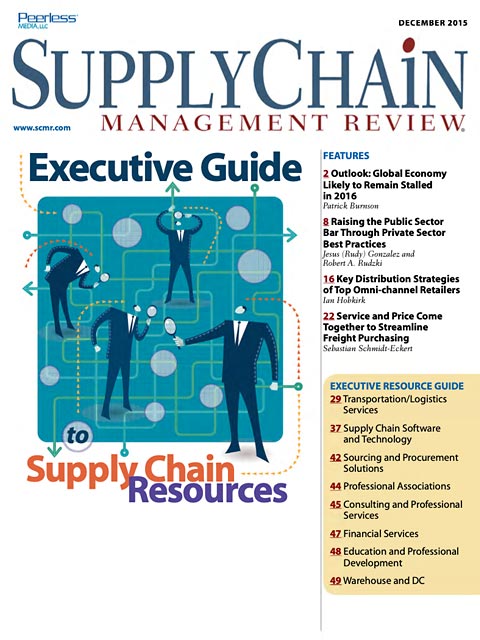Sorry, but your login has failed. Please recheck your login information and resubmit. If your subscription has expired, renew here.
December 2015
It’s December, and time once again for our annual Executive Guide to Supply Chain Resources. This is a comprehensive guide to services, products, and educational opportunities targeted specifically to supply chain professionals. The editors at Supply Chain Management Review wish all of our readers a successful year to come. Browse this issue archive.Need Help? Contact customer service 847-559-7581 More options
On June 11, 2015, nearly 200 people gathered at a venue in central London, for a sustainability conference hosted by Unilever. The event brought together Unilever employees and suppliers; representatives from academia, NGOs, and sector companies including Mars, GSK and Sainsbury’s, Coca-Cola Enterprises, and PwC.
In part, they had come together to celebrate a milestone: In January, Unilever announced that it had achieved 100 percent zero waste to the landfill across 242 industrial sites in 67 countries that manufactured products for brands such as Magnum, Knorr, Dove, and Domestos. The project had involved some 1,000 Unilever employees around the world. The goal was reached in December 2014, when the last plant, in Trinidad and Tobago, went to zero ahead of the company’s original 2020 target date.
But it wasn’t just Unilever partners in the room. Tony Dunnage, the Unilever group manufacturing sustainability director who oversaw the zero waste initiative, also invited some competitors to encourage other businesses to get on board. “If you think about it, our achievement was a drop in the ocean,” says Dunnage. “Our thinking was: Let’s invite other industry leaders and promote the zero waste mindset. Let’s stir it up and extend our reach.”
 |
This complete article is available to subscribers
only. Click on Log In Now at the top of this article for full access. Or, Start your PLUS+ subscription for instant access. |
SC
MR
Sorry, but your login has failed. Please recheck your login information and resubmit. If your subscription has expired, renew here.
December 2015
It’s December, and time once again for our annual Executive Guide to Supply Chain Resources. This is a comprehensive guide to services, products, and educational opportunities targeted specifically to supply chain… Browse this issue archive. Access your online digital edition. Download a PDF file of the December 2015 issue.
 |
Download Article PDF |
On June 11, 2015, nearly 200 people gathered at a venue in central London, for a sustainability conference hosted by Unilever. The event brought together Unilever employees and suppliers; representatives from academia, NGOs, and sector companies including Mars, GSK and Sainsbury's, Coca-Cola Enterprises, and PwC.
In part, they had come together to celebrate a milestone: In January, Unilever announced that it had achieved 100 percent zero waste to the landfill across 242 industrial sites in 67 countries that manufactured products for brands such as Magnum, Knorr, Dove, and Domestos. The project had involved some 1,000 Unilever employees around the world. The goal was reached in December 2014, when the last plant, in Trinidad and Tobago, went to zero ahead of the company's original 2020 target date.
But it wasn't just Unilever partners in the room. Tony Dunnage, the Unilever group manufacturing sustainability director who oversaw the zero waste initiative, also invited some competitors to encourage other businesses to get on board. “If you think about it, our achievement was a drop in the ocean,” says Dunnage. “Our thinking was: Let's invite other industry leaders and promote the zero waste mindset. Let's stir it up and extend our reach.”
 |
SUBSCRIBERS: Click here to download PDF of the full article. |
SC
MR

Latest Supply Chain News
- Technology’s role in mending supply chain fragility after recent disruptions
- Tech investments bring revenue increases, survey finds
- Survey reveals strategies for addressing supply chain, logistics labor shortages
- Israel, Ukraine aid package to increase pressure on aerospace and defense supply chains
- How CPG brands can deliver on supplier diversity promises
- More News
Latest Podcast

 Explore
Explore
Topics
Latest Supply Chain News
- Technology’s role in mending supply chain fragility after recent disruptions
- Tech investments bring revenue increases, survey finds
- Survey reveals strategies for addressing supply chain, logistics labor shortages
- Israel, Ukraine aid package to increase pressure on aerospace and defense supply chains
- How CPG brands can deliver on supplier diversity promises
- How S&OP provides the answer to in-demand products
- More latest news
Latest Resources

Subscribe

Supply Chain Management Review delivers the best industry content.

Editors’ Picks





